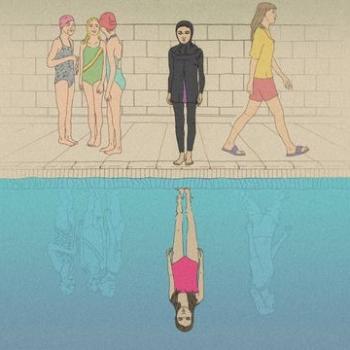 Ramadan, the Islamic holy month, begins this week. While many Americans know that it involves fasting, what most don’t know is that the holiday also essentially flips day into night.
Ramadan, the Islamic holy month, begins this week. While many Americans know that it involves fasting, what most don’t know is that the holiday also essentially flips day into night.
During Ramadan — which commemorates the Prophet Muhammad’s receiving of the Quran — Muslims stay up late praying more than usual, reading the Quran, eating and socializing. Together, all of these disrupted routines create a physical shift — and, ideally, spiritual shift — that helps them transcend the self and align with God.
“There’s a transformation that happens in the person when that shift takes place,” said Imam Mustafa Umar, religious director of the Islamic Institute of Orange County, California, and director of California Islamic University. “It might be that something about the nighttime and switching these rhythms makes us understand the world in a different way.”
Though Ramadan is entirely special, it’s not the only religious holiday or practice that places unique demands on the body that manifest in the soul. Believers in myriad other faith groups also use their bodies to induce spiritual experiences, whether they realize it or not.
Even something as simple as a daily prayer practice can send cues to the brain and create feelings of transcendence and oneness, scientists say. Approached with the right intent, religious rituals can unite practitioners with the people around them and with the divine.
“Fasting, sleep deprivation, sensory deprivation, meditating in a very quiet room — none of these practices in and of themselves are religious experiences but they elicit these experiences in people by quieting the brain down so whatever does happen becomes more meaningful,” said Dr. Andrew Newberg, research director at the Marcus Institute of Integrative Health and a pioneer in the field of neurotheology — that is, the study of the neuroscience behind religion.
The science of Ramadan
Muslims who fast during Ramadan abstain from food, drinks and even taking medication from sunrise to sundown. The month shakes up people’s routines and helps teach them self-discipline, Imam Umar said.
“It’s hard. It’s uncomfortable,” he said. “That’s exactly the problem — we’re too comfortable in life. You’re supposed to experience some discomfort.”
During Ramadan, things that are normally halal, or permitted, like eating or smoking, become haram, forbidden, except at night, Imam Umar pointed out. That explains why many Muslims are night owls for at least one month each year.
At sundown, Muslims break their fast with a light meal called iftar. Then comes evening prayers, which are longer than usual during Ramadan and often last one and a half to two hours. That’s more than double the time a Muslim usually spends on his or her five daily prayers, according to Imam Umar.
After evening prayers, a heavier meal is typically served. Many Muslims then stay up late into the night studying the Quran and socializing before snoozing a bit and rising again in the early morning hours, before the sun comes up, to have a third meal, called suhoor.
In other words, the three meals that would normally be consumed during the day all come at night during Ramadan, and that affects the quality of sleep that Muslims get throughout the month, according to Rachida Roky, a biology professor at the University of Hassan II in Casablanca, Morocco.
Eating raises your body temperature and your body temperature affects how you sleep, she said. Using EEGs, she’s been able to show that, during Ramadan, Muslims have less REM sleep, meaning they dream less and spend more time in lighter sleep.
In Muslim countries, many people also sleep in later during Ramadan and throw their biological clock out of sync with the sun’s cycles, said Dr. Ahmed BaHammam, a professor of medicine at King Saud University in Saudi Arabia and the director of the university’s Sleep Disorders Center.
All of these factors combine to make Ramadan an unusual, disorienting time. Fasting during the day and eating and socializing at night throws off the brain’s sense of whether it’s day or night, a period of wake or sleep, scientists said.
The science of spirituality
Some Muslims’ brains may also be affected by the time they spend in prayer during Ramadan. Using scans, Newberg’s shown that the frontal lobes, which humans use when we’re concentrating or purposefully doing something, “tended to deactivate” during intensive Islamic prayer.
The scans showed that praying Muslims “lose sense of purposefulness and surrender to the experience,” he said, noting that Islam calls on them to do exactly that.
Newberg adds that he found the same result when he studied the brains of Pentecostal Christians speaking in tongues. “They surrender themselves to this vocalization,” he said.
Newberg emphasizes that these changes in the brain don’t happen for everyone. His research has shown that a practitioner’s intention matters. A lot.
He points to an experiment he did on himself and the rabbi who is co-author of Newberg’s latest book, “The Rabbi’s Brain: Mystics, Moderns and the Science of Jewish Thinking,” as an example. They both underwent brain scans while saying the shma, a short but quintessential Jewish prayer, to compare how the brain of a secular Jew — Newberg has a sentimental attachment to the prayer but little more — differs from the brain of a committed believer.
“My brain didn’t do much at all during the shma,” Newberg said, “But his brain did something really interesting. Part of his frontal lobe went up and part of his frontal lobe went down — part went up because he was concentrating on saying the prayer but the other part down because he was submitting.”
So while our physical states can facilitate religious experiences, the intention with which one approaches worship is key, he concluded.
Imam Umar feels that, because Muslims are a minority in America, intentionality is naturally built into their Ramadan practices.
“In a Muslim majority country, you do it because everyone is doing it,” Imam Umar said. “Here, you have to go out of your way and there’s more intentionality.”
This article originally appeared on DeseretNews.com.














